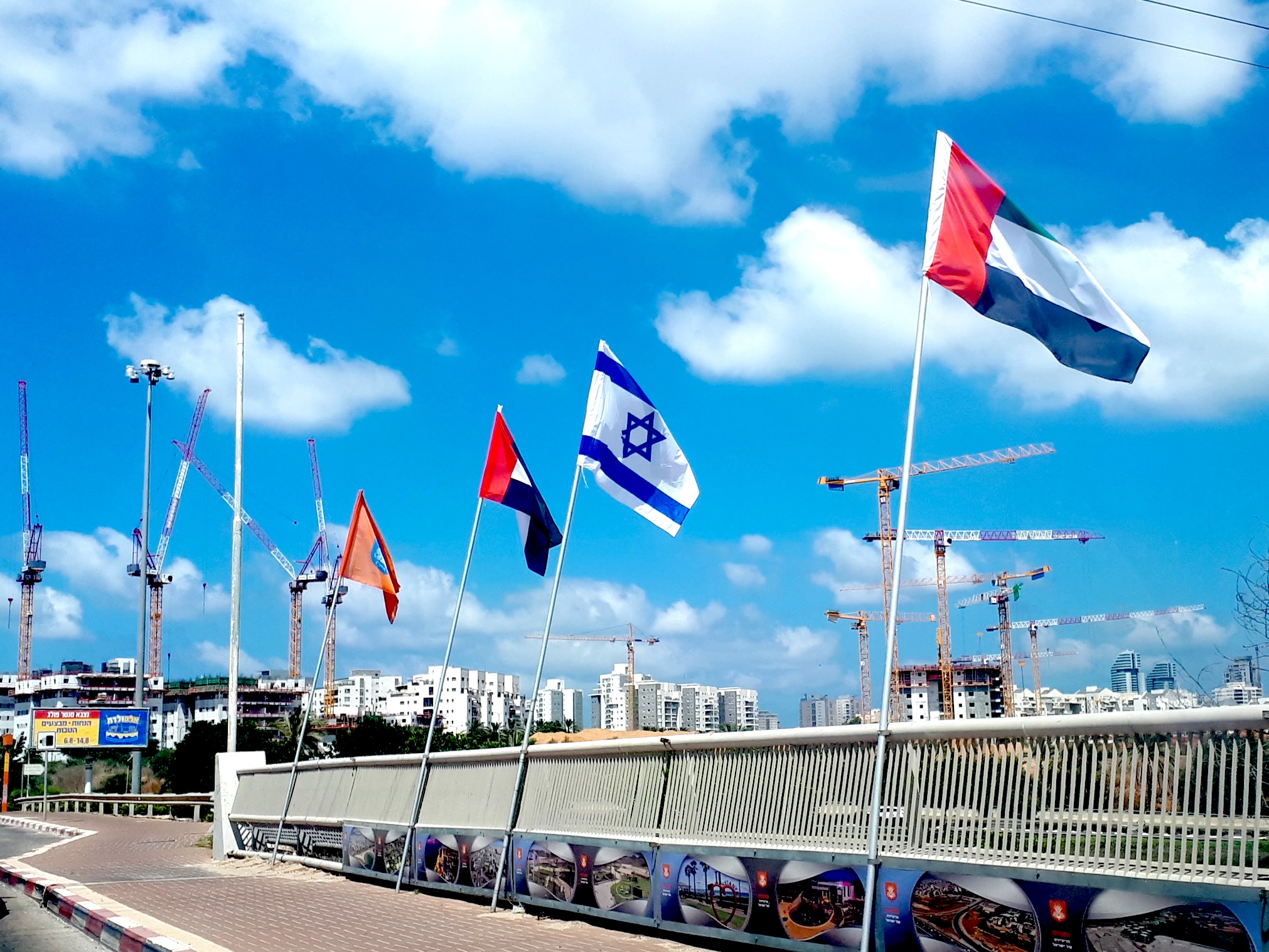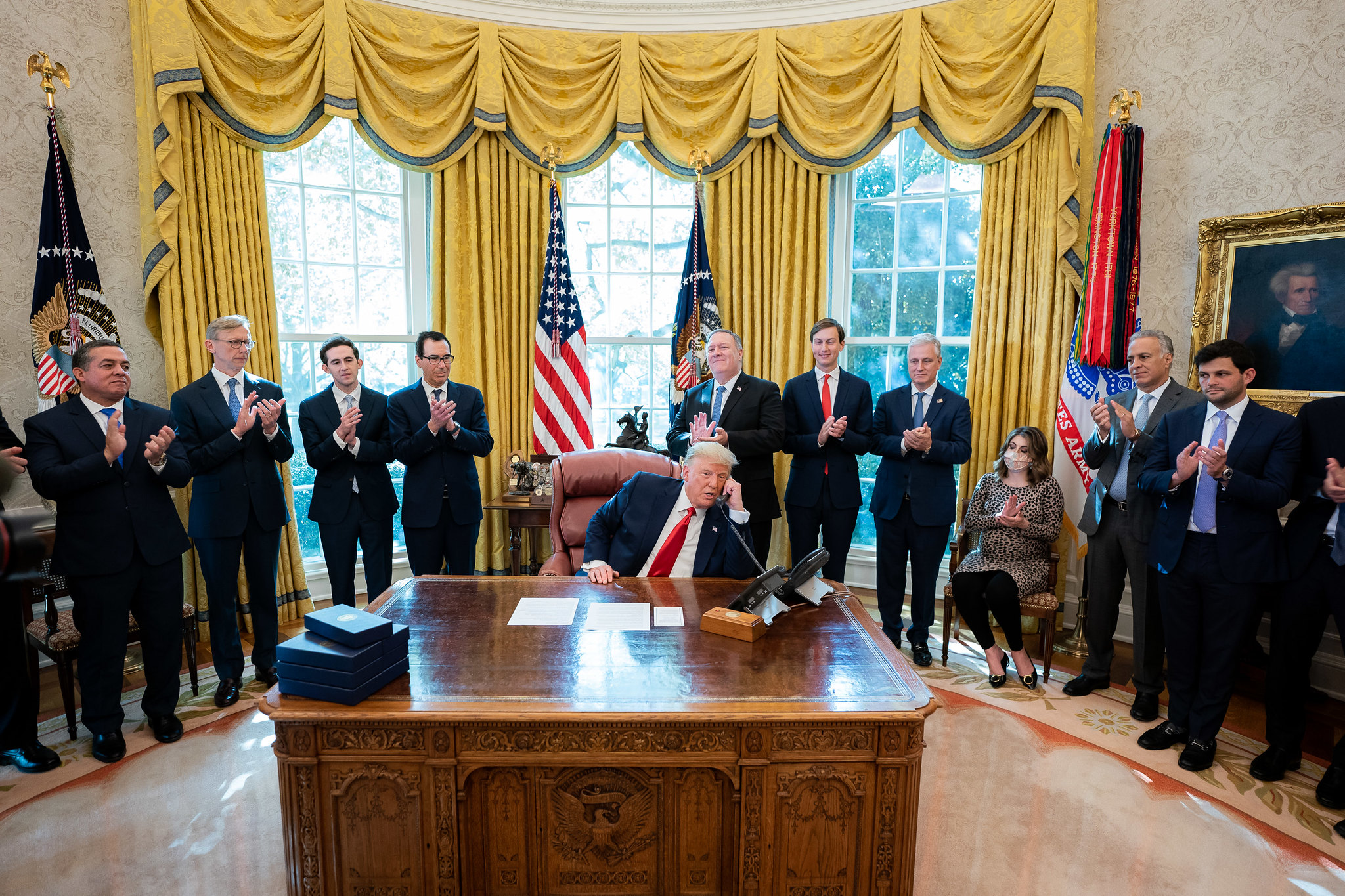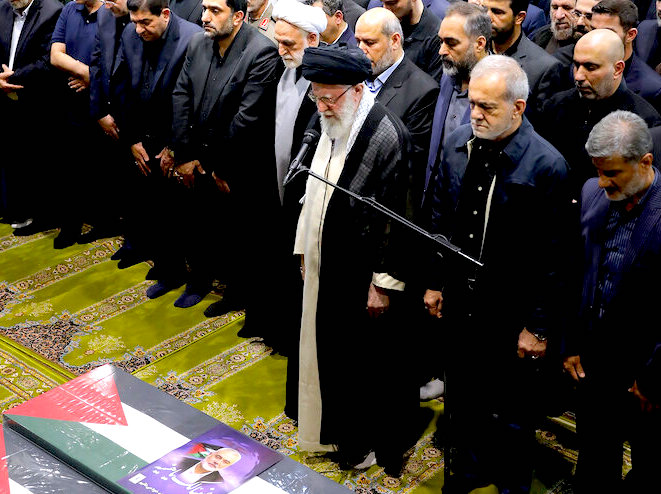The United Arab Emirates and Israel had hoped to extract strategic victories in Sudan, Robert Inlakesh reports. But Tehran may have foiled those ambitions.

Flags of Israel and the U.A.E., with the flag of Israeli city Netanya on Netanya’s “Shalom Bridge” in August 2020. (TaBaZzz/Wikimedia Commons/ CC BY-SA 4.0)
By Robert Inlakesh
MintPress News
 The United Arab Emirates and Israel had hoped to extract strategic victories in Sudan, taking advantage of the fall of the nation’s former dictator and the descent into civil war.
The United Arab Emirates and Israel had hoped to extract strategic victories in Sudan, taking advantage of the fall of the nation’s former dictator and the descent into civil war.
But newly released satellite images suggest that Tehran’s renewed ties with the Sudanese Armed Forces (SAF) of the central government of the Republic of Sudan may be unraveling those ambitions.
The satellite images, initially reported by Russian state broadcaster RT, reveal an extensive underground tunnel complex under SAF control, allegedly constructed with assistance from Iran’s Islamic Revolutionary Guard Corps (IRGC).
The facility, featuring 12 fortified entrances, is situated within mountainous terrain and mirrors Iranian missile bases designed to withstand aerial bombardments.
This has heightened concerns in Tel Aviv and Abu Dhabi regarding Iran’s expanding influence in Sudan.
????Hebrew sources: A huge underground tunnel complex in Sudan, presumably built by Iran’s Islamic Revolutionary Guard Corps, is located at 16.251586° 32.646261°
The underground base has 12 different entrances. It is located deep underground and is heavily fortified, modeled… pic.twitter.com/jAUPQeu61l
— Middle East Observer (@ME_Observer_) April 12, 2025
Background to a Civil War
Following Sudanese President Omar al-Bashir’s removal in April 2019 via a military coup spurred by widespread popular protests, regional actors, notably the U.A.E. and Israel, moved swiftly to take advantage of a nation undergoing a tumultuous political transformation. [The country’s humanitarian crisis is ranked as the largest in the world.]
Despite diplomatic efforts to prevent open conflict, Sudan slid into civil war in April 2023. The SAF, led by Abdel Fattah al-Burhan, faced off against the counter-coup Rapid Support Forces (RSF), a powerful paramilitary faction rooted in the notorious Janjaweed militias that were once loyal to Bashir and fought on behalf of his regime.
The RSF is led by billionaire warlord Mohamed Hamdan Dagalo, better known as Hemedti.

Mohamed Hamdan Dagalo, aka Hemedti, in 2022. (Government.ru, CC BY 4.0, Wikimedia Commons)
The UAE threw its weight behind Hemedti and the RSF — despite their well-documented war crimes —as part of Abu Dhabi’s broader push for influence in the Horn of Africa.
The UAE’s support was so extensive that Hemedti’s official Facebook page was reportedly operated from inside the Emirates.
Israel, meanwhile, had worked closely with the Trump administration during his first term to pressure the new leaders of Sudan into normalizing ties with Tel Aviv.
In exchange, Washington offered to remove Sudan from the U.S. list of state sponsors of terrorism, forgive debts and lift sanctions.
While normalization talks progressed, Israel deepened its political and intelligence footprint in Sudan. Hemedti signed a $6 million contract with a Canadian lobbying firm founded by ex-Israeli intelligence operative Ari Ben-Menashe. The RSF, who he is bankrolling, positioned itself as an opponent of “radical Islamists” and also openly advocated for normalization with Israel.

President Donald Trump in phone call with Sudan’s Chairman of the Sovereignty Council Abdel Fattah al-Burhan, Sudanese Prime Minister Abdalla Hamdok and Israeli Prime Minister Benjamin Netanyahu, to discuss Sudan’s recognition of Israel, Oct. 23, 2020. (White House, Tia Dufour)
[In January 2021, the new leaders of Sudan joined the UAE, Bahrain and Morocco in normalizing relations with Israel.]
When the civil war erupted in 2023, Israel moved quickly to cast itself as a potential mediator — citing ties to both sides. The Israeli Foreign Ministry expressed early support for Gen. al-Burhan and the SAF. But in reality, the Mossad was said to favor Hemedti’s RSF and reportedly maintained close contact with him in Khartoum.
A 2022 investigative report by Haaretz alleged that “high-end surveillance technology, made in the European Union, with the potential to tip the balance of power in Sudan,” had been delivered to the the counter-coup RSF by private jet. The Predator spyware reportedly originated from the Intellexa consortium, whose parent company Cytrox was founded by former Israeli intelligence officer Tal Dilian.
Israel’s Motives in Sudan
According to Israel Hayom, the country’s most-read daily news outlet, Sudan was seen as Israel’s strategic gateway to Africa — and a possible solution to its domestic dilemma push to deport some 150,000 African asylum seekers.
Israel and the U.A.E. also occupy Yemen’s strategic Socotra Island, indicative of a joint agenda in the region.
Despite Tehran’s close ties with Khartoum in the 1990s, the Islamic Republic was slowly pushed out of the North-East African nation, leading to a mutual severing of ties in 2016.
However, the civil war appears to have breathed new life into Iranian-Sudanese relations.
By July 2024, Iran had officially re-established ties with the SAF — the internationally recognized government — following calls for urgent military support from General al-Burhan, whose forces appeared to be losing the war with the RSF.
By October, the SAF had managed to turn the tide by capturing strategically significant routes and mountain ranges.
In September 2024, the Brussels International Center argued in a report that Iran’s delivery of Mohajer-6 and Ababil drones may have changed the course of the war and could deeply affect Israeli-Sudanese relations.
The report also noted that — despite normalization with Israel — the SAF’s rhetoric had taken a sharply anti-Israel turn since the outbreak of Israel’s war on Gaza. Iran’s increasing engagement, it said, “could diversify Iranian security partnerships and promote its ‘drone diplomacy.’”

The funeral for Hamas leader Ismail Haniyeh at Tehran University on Aug. 1, 2024, with Ali Khamenei leading prayer. (Khamenei.ir, Wikimedia Commons, CC BY 4.0)
Israeli Fears
By December, the conservative U.S.-based Jamestown Foundation reported that Iran was aiming to establish a naval base in Sudan and claimed that its drone deliveries to the SAF had already shifted the balance in key battles.
In February, Sudanese Foreign Minister Ali Yusuf and his Iranian counterpart Abbas Araghchi announced an agreement to boost trade, step up diplomatic coordination and involve Iran in post-war reconstruction efforts. In response, Israeli officials began expressing their concerns to local media.
Chief among Israel’s fears is that Sudan may again become a hub for weapons transfers by Iran’s IRGC to groups like Hamas and Hezbollah. In the past, Sudan had served as a corridor for arms transfers to Palestinian militants.
As recently as December 2023, Israel was reported to have carried out a failed intelligence operation to locate a former Sudanese general accused of supplying weapons to Hamas.
Following the release of satellite images showing a fortified underground base, new aerial footage surfaced suggesting that Sudan is operating Iranian “Malta AI Fajr-1” VHF radar systems along its Red Sea coast.
If confirmed, these developments point to a broader regional realignment — one where Iran, even as it loses ground in Syria, continues building alliances at Israel’s expense.
After the discovery of IRGC underground bases in Sudan, new footage shows that Iran has set up ‘Matla Al Fajr-1’ radars near Sudan’s Red Sea coast.
These radars can detect aircraft up to 300 kms away at altitudevof up to 20 kms and can track around 100 targets at the same time. pic.twitter.com/f3qgVnJGe6
— Current Report (@Currentreport1) April 12, 2025
Robert Inlakesh is a political analyst, journalist and documentary filmmaker currently based in London. He has reported from and lived in the occupied Palestinian territories and hosts the show ‘Palestine Files’. Director of Steal of the Century: Trump’s Palestine-Israel Catastrophe. Follow him on Twitter @falasteen47
This article is from MPN.news is an award winning investigative newsroom. Sign up for their newsletter.
Views expressed in this article may or may not reflect those of Consortium News.

Show Comments